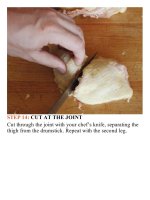The food lab better home cooking through science ( PDFDrive ) 1070
Bạn đang xem bản rút gọn của tài liệu. Xem và tải ngay bản đầy đủ của tài liệu tại đây (177.69 KB, 2 trang )
renderedbaconfat).Avoidusingbaconfatformoredelicate
thingslikevegetablesorfish.
Q:I’veheardthatifyoufryfishinoil,itcanmaketheoil
smellfishy.Anytruthinthat?
At one point or another, you’ve probably walked into a
restaurant or perhaps a neighbor’s home and immediately
caught a whiff of rancid, fishy-smelling oil.You may even
havesaidtoyourhost(orifyouaremorerestrainedthanI
have been in the past, to yourself), “Oof, somebody frying
fishinhere?”
Well,here’sthething:I’vegotbothafriedfishshopand
a fried chicken shop right on my block in Harlem. Oddly
enough, it’s the fried chicken joint that smells like rancid,
fishy oil, while the fried fish shop smells only of fresh
seafood. What gives? Turns out that the “fishy oil” smell
you get from fried foods has nothing to do with the fish
itself; it’s caused by the inexorable breakdown of fat
molecules.
Q:Hangonaminute.Breakdownoffatmolecules?
Soundstomelikeyou’retalkingaboutoxidationand
hydrolysis.Canyouexplainyourself?
No problem. Remember high school biology, where we
learned that a fat molecule is made up of three fatty acids
attached to a glycerol backbone, all arranged in a large
upper-case-E shape? Well, the problem is that these fat
moleculesarenotexactlystable.Givenexposuretooxygen
and enough time, they break down. And this gradual
breakdown is sped up by exposure to heat, light, and air.
Unfortunately, when you fry, all three of these types of
exposure occur in abundance. On its own, exposure to
oxygencausesoxidation,aprocessthatcausesthelargefat
molecules to break down, resulting in many smaller
molecules,amongthemketonesandshort-chainfattyacids.
Thesearethefoul-smellingmoleculesthatarethetruecause
of that fishy smell in fry shops, and this type of reaction
occursevenwhenyoudon’taddanyfoodtothehotoil.In
extremecases,itcanevenoccurinpoorlystoredbottlesof
oil(forthisreason,youshouldneverstoreyouroilnearthe
stove—you’resimplyinvitingrancidification).
Once you actually start frying things, it gets worse.
Hydrolysis,areactionthatoccurswhenyoucombinewater,
oil,andheat(i.e.,frysomething),compoundsandspeedsup
the effects of oxidation. That’s why oil used for frying
eventually breaks down and becomes stinky and unusable.
Dependingonhowhotyoufryandhowmuchfoodyoufry
at a time, a container of oil will get anywhere from a half
dozentoafewscoreofusesbeforeitbecomesunusable.
Finally,thelastwayinwhichoilbreaksdownisaprocess
calledsaponification—literally, the conversion of oil to
soap, and when we say soap, we’re not talking Ivory or
Dove bars, we’re talking about the chemical definition: a
chemicalsaltofafattyacid.‡Soapsareasurfactant,which
means they have a hydrophobic (oil-loving/water-hating)
end and ahydrophilic (water-loving/oil-hating) end. They
arethepeacemakersoftheoilandwaterworld,allowingthe
twotocoexistwithoutseparating,astheyarewonttodo.
In this case, though, peaceful coexistence is a bad thing:
themoresurfactantsyouroilcontains,themorewateritcan









